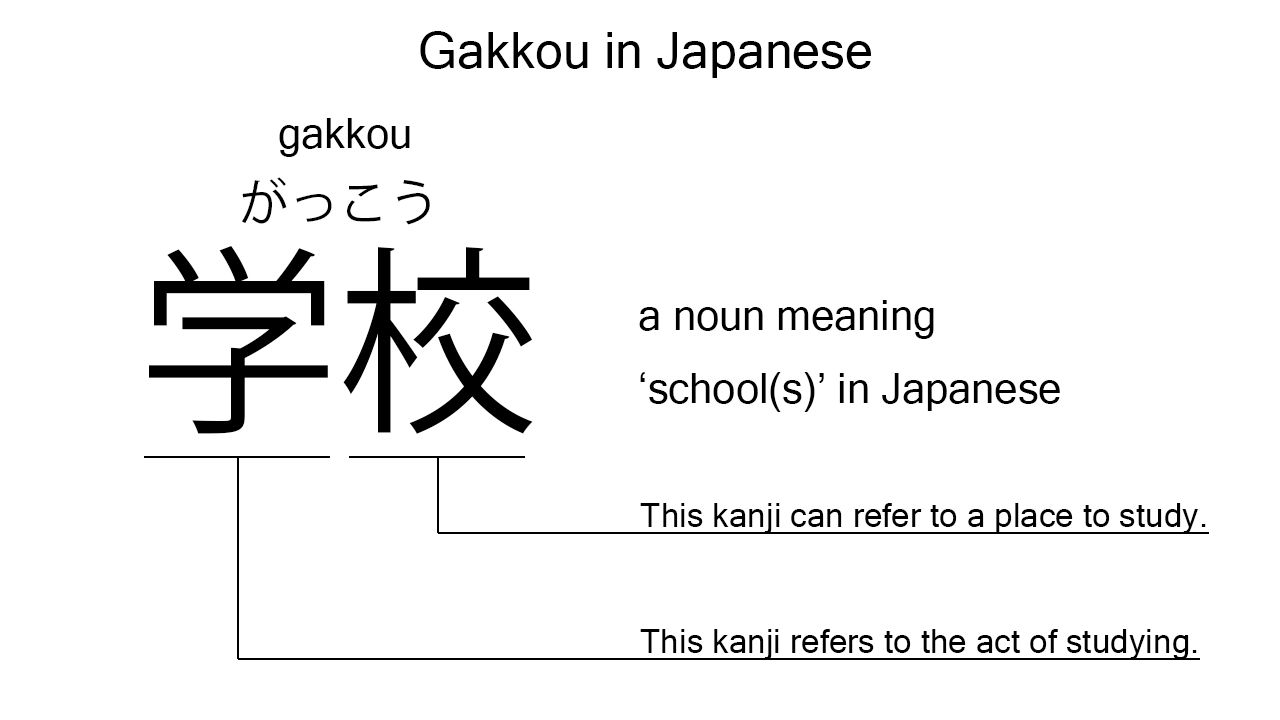What does “gakkou” mean in Japanese?
Native speakers use gakkou to mean a ‘school’ in Japanese. Perhaps, some Japanese learners know this word as it is sometimes used in Japanese textbooks. In this blog post, however, I will explain this word in detail based on its kanji expression. And also, I will explain how to use it through example sentences. My explanations would help Japanese learners understand gakkou more clearly. Then, let’s get started!
Contents
Definition and meaning of “gakkou”
Let me start with the definition and meaning of gakkou.
- gakkou – 学校 (がっこう) : a noun meaning a ‘school’ in Japanese. This can also work as plural. Learn more about Japanese plural.
The definition and meaning are simple and clear. To understand this noun more clearly, however, let me explain its kanji characters in detail, one by one.
Gakkou in kanji
The kanji expression of gakkou consists of the following two kanji characters:
- 学 : a kanji character used to refer to the act of studying or learning. This kanji can also be found in other words like gakusei, daigaku, and manabu.
- 校 : a kanji character often used to refer to a place to study or learn.
From these two kanji characters, we can understand that gakkou literally means a ‘place to study’ in Japanese. This literal interpretation is very close to the actual meaning, I think. Schools are often places to study.

When we meet new kanji expressions, we should check their kanji characters in detail to understand their meanings clearly and deeply. In many cases, kanji characters tell us a lot about the meanings of the expressions they form. Actually, here, we could get the better understanding of gakkou through the detailed kanji check above.
So far, I’ve explained the definition and meaning of gakkou together with its kanji characters. Then, let me explain how to use it through the example sentences below.
How to say “school” in Japanese
watashi wa ashita gakkou desu – 私は明日学校です (わたしはあしたがっこうです)
I have school tomorrow.
Below are the new words used in the example sentence.
- watashi – 私 (わたし) : a pronoun meaning ‘I’ in Japanese.
- wa – は : a binding particle working as a case marker or topic marker. In the example, this works as a topic marker after watashi to put a focus on it. The formed phrase, watashi wa, can sometimes work like the English phrase, for me.
- ashita – 明日 (あした) : a noun meaning ‘tomorrow’ in Japanese. This can also work as an adverb almost anywhere in a sentence. In the example, this works as an adverb in the middle of the sentence to mean ‘tomorrow’ in Japanese.
- desu – です : an auxiliary verb used after a noun or adjective to make it polite. Probably, this is well known as a part of Japanese desu form. In the example, this is used after gakkou to make it sound polite.
This is a typical usage of gakkou. In this example, it works as a part of the commonly-used phrase, ashita gakkou desu, which means ‘to have school tomorrow’ in Japanese.
Another example of “gakkou”
boku wa gakkou de kanojo ni at ta – 僕は学校で彼女に会った (ぼくはがっこうでかのじょにあった)
I met her at school.
Below are the new words used in the example sentence.
- boku – 僕 (ぼく) : a pronoun meaning ‘I’ in Japanese. This is used mainly by boys and young males.
- de – で : a case particle used to say where someone does something. In the example, this is used after gakkou to say where the speaker met her.
- kanojo – 彼女 (かのじょ) : a pronoun meaning ‘she’ in Japanese.
- ni – に : a case particle used to say to whom an action is directed. In the example, this is used after kanojo to say whom the speaker met.
- at – 会っ (あっ) : one conjugation of the verb, au, which means ‘to meet’ or ‘to see’ in Japanese. In the example, it has been conjugated for the better connection with its following word.
- ta – た : an auxiliary verb used after a verb, adjective, or auxiliary verb to make its past tense form. Probably, this is well known as a part of Japanese ta form. In the example, this is used after at to make its past tense form, at ta.
This is another typical usage of gakkou. In this example, it works together with the case particle, de, to say where the speaker met her. When we want to mean a ‘school’ or ‘schools’ in Japanese, anyway, this noun is always a very good option.
Summary
In this blog post, I’ve explained the definition and meaning of gakkou in detail based on its kanji expression. And also, I’ve explained how to use it through the example sentences. Let me summarize them as follows.
- gakkou – 学校 (がっこう) : a noun meaning a ‘school’ in Japanese. This can also work as plural. These two kanji characters literally mean a ‘place to study’ in Japanese. This literal interpretation is very close to the actual meaning, I think. Schools are often places to study. When we want to mean a ‘school’ or ‘schools’ in Japanese, this noun is always a very good option.
Hope my explanations are understandable and helpful for Japanese learners.
Leave a Reply